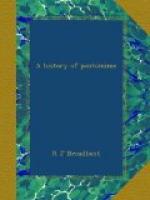Action (mentions Betterton, in his “History of the English Stage,” 1741), can never be in its perfection but on the stage. Action, indeed, has a natural excellence in it superior to all other qualities; action is motion, and motion is the support of nature, which without it would sink into the sluggish mass of chaos. Life is motion, and when that ceases, the human body so beautiful, nay so divine, when enlivened by motion, becomes a dead and putrid corpse, from which all turn their eyes. The eye is caught by anything in motion, but passes over the sluggish and motionless things as not the pleasing object of its view.
The natural power of motion, or action, is the reason that the attention of the audience is fixed by any irregular, or even fantastic action, on the stage, of the most indifferent player; and supine and drowsy when the best actor speaks without the addition of action. The stage ought to be the seat of passion in its various kinds, and, therefore, the actors ought to be thoroughly acquainted with the whole nature of the affections, and habits of the mind, or else they will never be able to express them justly in their looks and gestures, as well as in the tone of their voice and manner of utterance. They must know them in their various mixtures, as they are differently blended together in the different characters they represent; and then that excellent rule in the “Essay on Poetry” will be of equal use to the poet and player:—
Who must look within to find
These secret turns
of Nature in the mind;
Without this part in vain
would be the whole,
And but a body all
without a soul?
A few words more just to lay further stress on the importance of Pantomime, and then to return to our History. Take any part in any play, strip from it in its enactment the whole of its gesture language, could we realise that the actor appearing in it was portraying nature for us? Replace the Pantomime so essential to the part, and the character becomes—or rather should become if properly played—a creature of flesh and blood the same as ourselves. Pantomime, on the other hand, does not require words to be spoken to express its meaning, as it is quite expressible without.
A contemporary account of the production of the Pantomime “Harlequin Dr. Faustus,” at Drury Lane Theatre, forms interesting reading, in addition to providing a contrast with present-day Pantomime.
Every action is executed to different agreeable music, so adapted that it properly expresses what is going forward; in the machinery there is something so highly surprising that words cannot give a full idea of it. The effects described seem to be marvellous, considering the state of theatrical mechanism. A devil riding on a fiery dragon rides swiftly across the stage. Two country men and women enter to be told their fortunes, when Dr. Faustus waves his wand, and four pictures turn out of the scenes opposite, representing a judge




